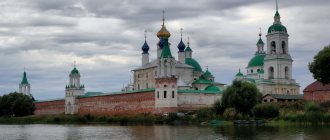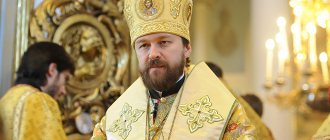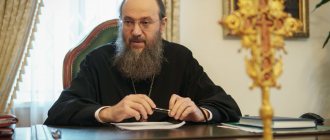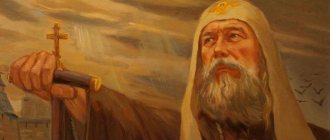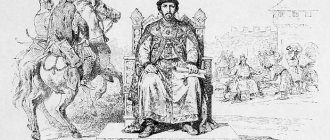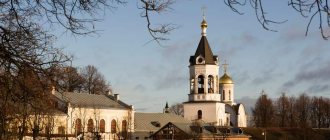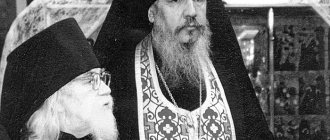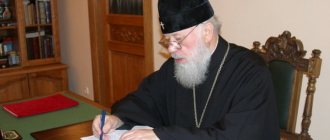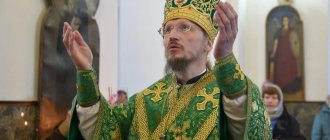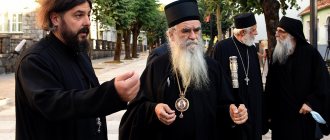| Metropolitan Nifont (Malt) |
Niphon (Malk)
(1948 - 2017), Metropolitan b. Volynsky and Lutsky, rector of the Lutsk Intercession Cathedral In the world, Vasily Andreevich Solodukha, was born on October 5, 1948 in the village of Galina Volya, Starovyzhevsky district, Volyn region of Ukraine, into a peasant family.
At the age of two he was left an orphan.
In 1963 he graduated from a local eight-year school.
From 1963 to 1967 he worked on a collective farm.
In 1967-1969 he served in the ranks of the Soviet army.
In 1969-1970 he worked at the railway depot of the city of Brest.
In 1970 he entered the Moscow Theological Seminary.
In 1971-1974 he was a subdeacon of the Patriarch of Moscow and All Rus' Pimen.
On March 20, 1974, he was tonsured a monk at the Trinity-Sergius Lavra with the name Nifont.
On April 15 of the same year, he was ordained to the rank of hierodeacon in the Epiphany Cathedral in Elokhov, Moscow, by Patriarch Pimen of Moscow and All Rus'.
In 1974 he graduated from the Moscow Theological Seminary and in the same year entered the Moscow Theological Academy, from which he graduated in 1979 with a candidate of theology degree.
On February 26, 1977, he was ordained to the rank of hieromonk in the Intercession Academic Church of the Trinity-Sergius Lavra by the rector of the MDAiS, Archbishop Vladimir (Sabodan) of Dmitrov and sent to serve in the Volyn diocese.
On March 18, 1977, he was appointed rector of the Trinity Church in the village of Rudka Kozinskaya, Rozhishchensky district, Volyn region.
In 1985 he was elevated to the rank of abbot.
In 1988, he was elevated to the rank of archimandrite by Archbishop of Volyn and Rivne Varlaam (Ilyushchenko).
In 1989, he was appointed dean of the Rozhishchensky district of the Volyn-Rivne diocese.
On March 20, 1990, he was determined to be the Bishop of Khmelnitsky and Kamenets-Podolsk. On March 30 he was named, and on March 31 he was consecrated Bishop of Khmelnitsky and Kamenets-Podolsk in the Vladimir Cathedral in Kiev.
On August 25, 1992, he was transferred to the Volyn department due to the difficult interfaith situation in the city of Lutsk.
On July 28, 1993, he was elevated to the rank of archbishop.
On April 11, 2001 he was elevated to the rank of metropolitan.
From July 13, 2006 to February 26, 2010, he was the acting rector of the Volyn Theological Seminary [1].
Since July 20, 2012, it was titled Volyn and Lutsk [2].
On October 18, 2016, he was released from the management of the diocese due to health reasons, with a stay in the city of Lutsk and appointment as rector of the Lutsk Intercession Cathedral [3].
He died at four o'clock in the morning on March 22, 2022, at the age of 69.
Awards
Church:
- Order of St. Anthony and Theodosius of Kiev-Pechersk II Art. (1998, UOC)
- order of honor book Daniel of Moscow II Art. (1998)
- Order of Equals book Vladimir III Art. (1999, UOC)
- Order of the Nativity of Christ - 2000, 1st class. (2000, UOC)
- medal “Kharkov Cathedral - 10 years”, 1st degree (2002, UOC)
- Order of St. Sergius of Radonezh II Art. (2003)
- Order of Equals book Vladimir I-II centuries, with the title “Sergeant Major of the Order of St. Prince Vladimir” (2003, UOC)
- Order of St. ap. John the Evangelist II Art. (2005, in connection with the 15th anniversary of the episcopal consecration)
- Order of St. Nestor the Chronicler II Art. (2006, UOC)
- Order of St. equal to Mary Magdalene II Art. (2008, Polish Orthodox Church)
- Order of St. Cyril and Methodius I Art. (2008, Orthodox Church of the Czech Lands and Slovakia)
- Order of St. Alexy of Moscow III Art. (2008)
- Order of St. ap. John the Evangelist I Art. (2008)
- medal named after St. Cyril and Methodius I Art. (2008, Uzhgorod Theological Academy)
- scientific degree “Honorary Doctor of Theology” from the Uzhgorod Ukrainian Theological Academy named after Saints Methodius and Cyril (February 20, 2008, for significant services to the UOC and for a significant contribution to the development of theological education [4])
- Order of St. Dimitry Rostovsky (2010)
- honor of the Primate of the UOC (2011)
- Order of St. Anthony and Theodosius of Pechersk I Art. (2012)
- Order of St. Seraphim of Sarov II Art. (2013, in connection with the 65th anniversary of his birth) [5]
- right of service with two panagias (2014) [6]
Secular:
- medal "For Humanism" (1997, )
- diploma winner in the nomination “Charity of the Year” in the program “Person of the Year’98” Lutsk (1998)
- Certificate of honor from the Volyn Regional Council of People's Deputies (1998, for selfless work in the spiritual revival of Volyn, active participation in organizing and conducting charity and mercy events)
- recognized as a benefactor of the year in the program “Person of the Year of the Volyn Region '99” (1999)
- Order of Merit, III class. (1999, Ukraine)
- commemorative medal of the President of Ukraine for the 10th anniversary of Ukraine's independence (2001)
- Diploma of Laureate of Regional Philanthropy and Sponsorship (2001, Volyn Regional State Administration)
- memorial sign of the Children's Fund of Ukraine “I give my heart to children” (twice: 2003 (first in Volyn), 2004)
- Order of Merit, II class. (2003, Ukraine)
- Badge "Excellent Border Guard" 1st class. (2003, command of the Volyn border detachment)
- Order of Cossack Glory, 1st class. (2003, MOO "Cossacks Zaporozhye")
- Medal "For Merit" III class. (2005, Union of Afghanistan Veterans)
- gold medal “Cossack Glory” and medal of the 10th anniversary of the MOO “Zaporozhye Cossacks” (2006)
- distinction of the Ministry of Internal Affairs of Ukraine “For assistance to the internal affairs bodies of Ukraine” (2007)
- Order of the Intercession, 1st class. (2007, Supreme Ataman of Ukraine and Diaspora)
- Order of Merit, 1st class. (2008, Ukraine)
- honorary insignia of the Department of the Ministry of Internal Affairs of Ukraine in the Volyn region (2008)
- Order "Hetman Baida - Vishnevetsky" 1st class. (2008, MOO "Cossacks Zaporizhzhya")
Notes
- ↑ 1234567891011
Bishops of Khmelnytsky and Kamenets-Podilsky Varlaam (Borisevich) (1955-1956) • Hilarion (Kochergin) (1956-1961) • Ignatius (Demchenko) (1961-1962) • Feodosius (Dikun) (1990) • Nifont (Solodukha) (1990-1992) • Pitirim ( Starinsky) (1992-1993) Bishops of Kamenets-Podolsk and Proskuriv Pankratiy (Kashperuk) (1946-1948) • Varlaam (Borisevich) (1948-1951) • Anatoly (Busel) (1951-1953) • Andrey (Sukhenko) (1953-1955, high school) Bishops of Proskurov Valerian (Rudich) (1921-1923) • Dimitri (Galitsky) (1927-1932) Ruling Augustine (Markevich) · Agapit (Bevtsik) · Agafangel (Savvin) · Alexy (Grokha) · Alexy (Shpakov) · Alipy (Kozoliy) · Ambrose (Polykope) · Anatoly (Gladky) · Anthony (Pakanich) · Anthony (Fialko) · Bogolep (Goncharenko) · Bartholomew (Vashchuk) · Vissarion (Stretovich) · Vladimir (Melnik) · Vladimir (Orachev) · Evlogiy (Gutchenko) · Eusebius (Dudka) · Elisha (Ivanov) · Efrem (Kitsai) · Efrem (Yarinko) · Hilarion (Shukalo) · John (Siopko) · Joasaph (Guben) · Jonathan (Eletskikh) · Joseph (Maslennikov) · Irenaeus (Semko) · Irineus (Sredny) · Lazarus (Shvets) · Luke (Kovalenko) · Mark (Petrovtsy) · Meletiy (Egorenko) · Mitrofan (Nikitin) · Mitrofan (Yurchuk) · Nathanael (Krikota) · Nikodim (Baranovsky) · Nikodim (Gorenko) · Nikolai (Kapustin) · Onufriy (Legky) · Panteleimon (Lugovoy) · Panteleimon (Povoroznyuk) · Pitirim (Starinsky) Platon (Udovenko) Roman (Kimovich) Sergius (Gensitsky) Simeon (Shostatsky) Sophrony (Dmitruk) Tikhon (Chizhevsky) Feodor (Gayun) Feodor (Mamasuev) Filaret (Zverev) Filaret (Kucherov) Philip (Osadchenko) Vicars Alexander (Drabinko) · Alexander (Nesterchuk) · Alypiy (Pogrebnyak) · Anthony (Borovik) · Anthony (Kripak) · Arkady (Taranov) · Arseny (Yakovenko) · Varnava (Filatov) · Varsonofy (Vinnichenko) · Varsonofy (Stolyar) · Veniamin (Pogrebnoy) · Victor (Bykov) · Vladimir (Moroz) · Damian (Davydov) · Diodorus (Vasilchuk) · Evlogiy (Kid) · Ilariy (Shishkovsky) · John (Vakhnyuk) · Jonah (Cherepanov) · Cassian (Shostak) · Clement (Evenings) Longinus (Heat) Nikolai (Grokh) Nikolai (Postal) Pavel (Swan) Panteleimon (Bashchuk) Seraphim (Demyaniv) Sergius (Zaliznitsky) Sergius (Mikhailenko) Feodosius (Snigiryov) At rest Vasily (Zlatolinsky) · Gury (Kuzmenko) · Dionysius (Konstantinov) · Innokenty (Shestopal) · Ioannikiy (Kobzev) · Hippolytus (Khilko) · Niphont ( Maloduha) · Panteleimon (Romanovsky) Former bishops
*Translated Anthony (Moskalenko) · Gleb (Savin) · Job (Smakouz) · Job (Tyvonyuk) · Nektary (Frolov) Defrocked Filaret (Denisenko) · Andrey (Gorak) · Jacob (Panchuk) Deceased Anthony (Vakarik) · Vasily (Vasiltsev) · Vladimir (Sabodan) · Evfimy (Shutak) · Kronid (Mishchenko) · Leonty (Gudimov) · Macarius (Svistun) · Methodius (Petrovtsy) · Nikanor (Yukhimyuk) · Nikodim (Rusnak) · Savva (Babinets) · Sevastian (Pilipchuk) · Tikhon (Zhilyakov) · Feodosius (Dikun) - Since the transformation of the Ukrainian Exarchate of the Moscow Patriarchate into the Ukrainian Orthodox Church (Moscow Patriarchate) in October 1990.
An excerpt characterizing Niphon (Malt)
“At dawn, two new batteries, built in the night, on the plain occupied by the Prince of Eckmuhl, will open fire on the two opposing enemy batteries. At the same time, the chief of artillery of the 1st Corps, General Pernetti, with 30 guns of the Compan division and all the howitzers of the Dessay and Friant divisions, will move forward, open fire and bombard the enemy battery with grenades, against which they will act! 24 guns of the Guards artillery, 30 guns of the Compan division and 8 guns of the Friant and Desseux divisions, a total of 62 guns. The chief of artillery of the 3rd Corps, General Fouche, will place all the howitzers of the 3rd and 8th Corps, 16 in total, on the flanks of the battery, which is assigned to bombard the left fortification, which will total 40 guns against it. General Sorbier must be ready, at the first order, to march with all the howitzers of the Guards artillery against one or another fortification. Continuing the cannonade, Prince Poniatowski will head towards the village, into the forest and bypass the enemy position. General Compan will move through the forest to take possession of the first fortification. Upon entering the battle in this way, orders will be given according to the actions of the enemy. The cannonade on the left flank will begin as soon as the cannonade of the right wing is heard. The riflemen of Moran's division and the Viceroy's division would open heavy fire when they saw the beginning of the attack of the right wing. The Viceroy will take possession of the village [of Borodin] and cross his three bridges, following at the same height with the divisions of Morand and Gerard, which, under his leadership, will head to the redoubt and enter the line with the rest of the army. All this must be done in order (le tout se fera avec ordre et methode), keeping the troops in reserve as much as possible. In the imperial camp, near Mozhaisk, September 6, 1812.” This disposition, written in a very unclear and confused way, if we allow ourselves to regard his orders without religious horror at Napoleon’s genius, contained four points - four orders. None of these orders could be or were carried out. The disposition says, first: that the batteries set up at the place chosen by Napoleon with the Pernetti and Fouche guns aligned with them, a total of one hundred and two guns, open fire and bombard the Russian flashes and redoubts with shells. This could not be done, since the shells from the places appointed by Napoleon did not reach the Russian works, and these one hundred and two guns fired empty until the nearest commander, contrary to Napoleon’s orders, pushed them forward. The second order was that Poniatowski, heading towards the village into the forest, should bypass the left wing of the Russians. This could not be and was not done because Poniatovsky, heading towards the village into the forest, met Tuchkov there blocking his way and could not and did not bypass the Russian position. Third order: General Kompan will move into the forest to take possession of the first fortification. Compan's division did not capture the first fortification, but was repulsed because, leaving the forest, it had to form under grapeshot fire, which Napoleon did not know. Fourth: The Viceroy will take possession of the village (Borodino) and cross his three bridges, following at the same height with the divisions of Maran and Friant (about which it is not said where and when they will move), which, under his leadership, will go to the redoubt and enter the line with other troops. As far as one can understand - if not from the confused period of this, then from those attempts that were made by the Viceroy to carry out the orders given to him - he was supposed to move through Borodino on the left to the redoubt, while the divisions of Moran and Friant were supposed to move simultaneously from the front. All this, as well as other points of disposition, was not and could not be fulfilled. Having passed Borodino, the viceroy was repulsed at Kolocha and could not go further; The divisions of Moran and Friant did not take the redoubt, but were repulsed, and the redoubt was captured by cavalry at the end of the battle (probably an unexpected and unheard of thing for Napoleon). So, none of the orders of the disposition were and could not be executed. But the disposition says that upon entering the battle in this way, orders will be given corresponding to the actions of the enemy, and therefore it would seem that during the battle Napoleon would make all the necessary orders; but this was not and could not be because during the entire battle Napoleon was so far from him that (as it turned out later) the course of the battle could not be known to him and not a single order of his during the battle could be carried out. Many historians say that the Battle of Borodino was not won by the French because Napoleon had a runny nose, that if he had not had a runny nose, his orders before and during the battle would have been even more ingenious, and Russia would have perished, et la face du monde eut ete changee. [and the face of the world would change.] For historians who recognize that Russia was formed by the will of one man - Peter the Great, and France from a republic developed into an empire, and French troops went to Russia by the will of one man - Napoleon, the reasoning is that Russia remained powerful because Napoleon had a big cold on the 26th, such reasoning is inevitably consistent for such historians. If it depended on the will of Napoleon to give or not to give the Battle of Borodino and it depended on his will to make this or that order, then it is obvious that a runny nose, which had an impact on the manifestation of his will, could be the reason for the salvation of Russia and that therefore the valet who forgot to give Napoleon On the 24th, waterproof boots were the savior of Russia. On this path of thought, this conclusion is undoubted - as undoubted as the conclusion that Voltaire made jokingly (without knowing what) when he said that the Night of St. Bartholomew occurred from an upset stomach of Charles IX. But for people who do not allow that Russia was formed by the will of one person - Peter I, and that the French Empire was formed and the war with Russia began by the will of one person - Napoleon, this reasoning not only seems incorrect, unreasonable, but also contrary to the whole essence human. To the question of what constitutes the cause of historical events, another answer seems to be that the course of world events is predetermined from above, depends on the coincidence of all the arbitrariness of the people participating in these events, and that the influence of Napoleons on the course of these events is only external and fictitious. Strange as it may seem at first glance, the assumption that the Night of St. Bartholomew, the order for which was given by Charles IX, did not occur at his will, but that it only seemed to him that he ordered it to be done, and that the Borodino massacre of eighty thousand people did not occur at the will of Napoleon (despite the fact that he gave orders about the beginning and course of the battle), and that it seemed to him only that he ordered it - no matter how strange this assumption seems, but human dignity tells me that each of us, if not more, then no less a person than the great Napoleon orders that this solution to the issue be allowed, and historical research abundantly confirms this assumption. In the Battle of Borodino, Napoleon did not shoot at anyone and did not kill anyone. The soldiers did all this. Therefore, it was not he who killed people. The soldiers of the French army went to kill Russian soldiers in the Battle of Borodino not as a result of Napoleon’s orders, but of their own free will. The entire army: the French, Italians, Germans, Poles - hungry, ragged and exhausted from the campaign - in view of the army blocking Moscow from them, they felt that le vin est tire et qu'il faut le boire. [the wine is uncorked and needs to be drunk.] If Napoleon had forbidden them to fight the Russians now, they would have killed him and gone to fight the Russians, because that was what they needed. When they listened to the order of Napoleon, who presented to them for their injuries and death, as a consolation, the words of posterity that they too had been in the battle of Moscow, they shouted “Vive l'Empereur!” just as they shouted "Vive l'Empereur!" at the sight of an image of a boy piercing the globe with a bilboke stick; just as they would shout "Vive l'Empereur!" with any nonsense that would be said to them. They had no choice but to shout “Vive l'Empereur!” and go fight to find food and rest for the victors in Moscow. Therefore, it was not as a result of Napoleon’s orders that they killed their own kind.
essays
interview
- With faith in Russia (Interview with the Representative of the Antiochian Patriarchate to the Moscow Patriarchate)
- "NG-RELIGIONS": Messenger of ancient Antioch. Religion should serve man, and not vice versa, says Bishop Niphon
- Bishop Niphon: “I am pleased to serve the Russian people”
- Bishop NIFON of Philippopolis: WE CANNOT BE LIKE EVERYONE else! // Magazine “Foma”, No. 7 (51) July 2007
- Bread, salt and love, or half a century in Russia of Archbishop Niphon (+ Video + photo)
- Archbishop Niphon of Philippopolis: All these years I have tried to combine oriental beauty with Russian spirituality
- Niphon, Archbishop of Philippopolis (Saikali)
Footnotes
- Notes on Arab Orthodoxy: Archbishop Niphon (Seikaly) and the Antiochian Representation in Moscow
- Gabriel the Archangel and Theodore Stratilates in the Antioch Metochion - Deanery
- The rector of the Antioch metochion in Moscow was elevated to the rank of archbishop / News / Patriarchia.ru.
- https://www.antiochpatriarchate.org/en/page/statement-issued-by-the-secretariat-of-the-holy-synod-of-antioch/637/
| Date of consecration: November 13, 1988 |
events
- Ecumenical Prayer 1980 (January 22, 1980)
- Ecumenical Prayer 1981 (26 January 1981)
- Ecumenical Prayer 1983 (March 16, 1983)
- Ecumenical Prayer 1984 (February 8, 1984)
- Ecumenical Prayer 1986 (23 January 1986)
- Millennium of the Baptism of Rus' (conference) (July 21, 1986)
- Ecumenical Prayer 1987 (January 30, 1987)
- Ecumenical Prayer 1988 (January 26, 1988)
- Ecumenical Prayer 1989 (27 January 1989)
- Ecumenical Prayer for Peace (September 1, 1989)
- World Summit of Religious Leaders (3 July 2006)
- Ecumenical Prayer 2022 (January 23, 2019)
hierarchy
In 1959 he was ordained to the diaconate. In 1964, in the Church of St. Nicholas in Zahle, he was ordained a priest and elevated to the rank of archimandrite.
On May 9, 1977, he was appointed rector of the metochion of the Antiochian Church in Russia and representative of the Patriarch of Antioch to the Patriarch of Moscow.
In 1988, in Damascus (Syria), he accepted episcopal consecration as Bishop of Philippopolis (Shahb) with the participation of Metropolitan Philaret of Minsk and Slutsk.
On October 8, 2009, by decision of the Holy Synod of the Antiochian Patriarchate, he was elevated to the rank of archbishop. On July 4, 2014, he was elevated to the rank of metropolitan.
